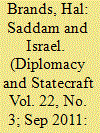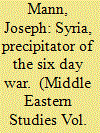|
|
|
Sort Order |
|
|
|
Items / Page
|
|
|
|
|
|
|
| Srl | Item |
| 1 |
ID:
107069


|
|
|
|
|
| Publication |
2011.
|
| Summary/Abstract |
This article uses newly available Iraqi records to examine Saddam Hussein's strategic view of Israel, from the time of his political ascendancy in the late 1970s to the Persian Gulf War of 1990-1991. It sheds light on a variety of issues: the sources and motives of Saddam's bitter hostility to Israel, his desire for a bloody war of attrition against the "Zionist entity," the role of Israel in motivating the Iraqi nuclear programme, Iraq-Israel relations during the Iran-Iraq War, Saddam's fears of an Israeli strike in the run-up to the invasion of Kuwait in 1990, and his motives for attacking Israel with SCUD missiles in 1991.
|
|
|
|
|
|
|
|
|
|
|
|
|
|
|
|
| 2 |
ID:
122048


|
|
|
|
|
| Publication |
2013.
|
| Summary/Abstract |
The Six Day War is renowned for its impact on the shaping of the Middle East. In the last few decades, much research examining the reasons for the outbreak of the Six Day War, its development and its ramifications has been published. Most of the research has focused on an examination of Israeli government policy before and after the war, on the Egyptian regime's hatred of the 'Zionist entity' and on the involvement of the superpowers during and after the war. Some research has also touched on Syria's role in the outbreak of the war. Researchers such as Eyal Zisser and Moshe Maoz have shown Syria's decisive role in initiating the war and suggest that various factors, such as a lack of government stability in Syria, precipitated the conflict. This research continues, to a great extent, in the line of those researchers: indeed, it points to Syria as being the main factor behind the outbreak of war through an examination of the changes that occurred in the character of its government from 1966. However, unlike other research so far, this attempts to show that the unique character of the neo-Ba'ath regime is what brought war to the region and that, had the Ba'ath coup not occurred in 1966, it is doubtful whether Syria would have entered the conflict. This article seeks to emphasize that the Syrian regime went blindly into the war despite military unpreparedness and a lack of political and military cooperation with other Arab countries and with the Soviets. It also exposes, for the first time, the state of the Syrian troops on the front and in the cities, as well as the feelings of the senior officers on the eve of the war, and reveals documents about the military and political cooperation between Syria and Egypt that would eventually force President Nasser to enter a war he did not want to get involved in. Moreover, the research exposes the deep rift - which many believe pushed Syria to take rash independent measures -between the Soviet leadership and the Ba'ath regime before the war. And, finally, the research exposes the atmosphere in Syria following the war, and the administrative and military steps the Syrian regime took immediately after the defeat in order to consolidate its power.
|
|
|
|
|
|
|
|
|
|
|
|
|
|
|
|
|
|
|
|
|